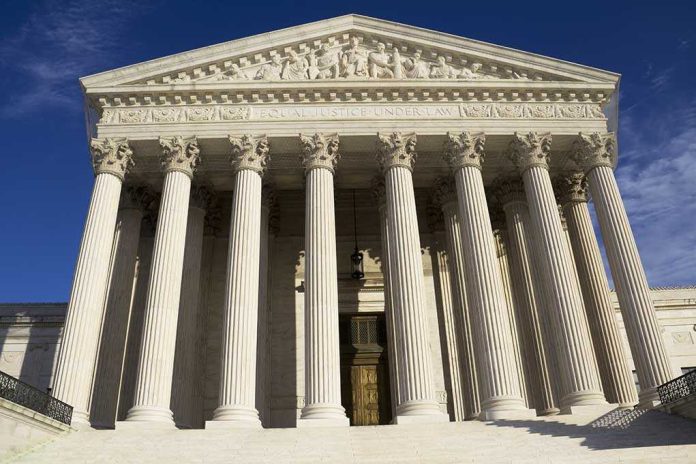
In a decision that restores basic truth and order to federal documentation, the Supreme Court has handed President Trump a major victory by allowing his administration’s requirement for biological sex on passports to take immediate effect, despite fierce opposition from the left.
Story Snapshot
- Supreme Court grants Trump administration’s request to enforce biological sex listing on all new U.S. passports.
- Left-wing activists and advocacy groups decry the policy as a setback for transgender rights while litigation continues.
- The decision signals a return to common-sense standards, strengthening document security and integrity.
- Ongoing legal battles mean the policy’s final fate is still pending, but the Trump administration’s agenda gains momentum.
Supreme Court Greenlights Trump’s Passport Policy Shift
The U.S. Supreme Court granted the Trump administration’s emergency appeal, allowing a policy requiring all new passports to display an individual’s biological sex instead of any self-declared gender identity. This move reverses Obama-era rules that permitted gender marker changes with a doctor’s note, marking a return to factual, birth-certificate-based identification on federal documents. The Supreme Court’s decision is procedural, meaning it is not a final determination of the policy’s constitutionality, but it enables immediate enforcement as litigation proceeds in lower courts.
Conservative Americans have watched, for years, as activist judges and bureaucrats undermined what most see as basic truths—male and female, determined at birth—under the guise of “inclusion.” The Trump administration’s policy, now greenlit by the Supreme Court, aims to restore uniformity and security to federal identification, a critical step many believe is necessary for national security, travel integrity, and the prevention of fraud. The Department of State is already enforcing this policy, requiring new and renewed passports to reflect biological sex as shown on the applicant’s original birth certificate.
Background: From Obama-Era Gender Policy to 2025’s Restoration of Reality
Federal gender marker policy has swung dramatically in recent years. In 2010, the Obama administration allowed gender marker changes on passports with a physician’s certification, opening the door for identity documents to reflect claimed gender rather than biological sex. President Trump’s first term reversed several of these policies, and with his return to office, the administration doubled down by mandating that passports list only birth sex. This shift unfolded amid ongoing debates about transgender rights in sports, healthcare, and public spaces, and follows Trump’s executive orders protecting women’s sports and banning irreversible interventions for minors.
Legal challenges from the American Civil Liberties Union and LGBTQ+ advocacy groups came swiftly, arguing the policy is discriminatory and endangers transgender individuals. A federal district court initially blocked the policy, but the Trump administration appealed all the way to the Supreme Court, which has now granted a stay—allowing the policy to take effect while the underlying case, Orr v. Trump, continues. Both sides recognize the high stakes: the outcome could set a precedent for federal recognition of gender identity versus biological sex in official documentation nationwide.
Key Stakeholders and Political Ramifications
At the center of the battle are the Trump administration and the Department of State, which assert the need for clear, objective federal identification for security and administrative purposes. Plaintiffs, led by the ACLU, seek expanded recognition of transgender identities across all federal documents. The Supreme Court justices, in granting the stay, have signaled respect for executive authority in managing federal policy, at least while legal questions are resolved. Advocacy leaders and legal analysts on both sides see the case as pivotal for the future direction of federal civil rights law and executive power.
The decision also reinforces a broader conservative push to dismantle the radical left’s “woke” agenda, which many see as eroding common sense, family values, and constitutional freedoms. President Trump’s supporters view this victory as part of a series of rollbacks on Biden-era and Obama-era policies that prioritized ideology over facts. The policy’s enforcement is widely seen among conservatives as a win for truth, order, and the protection of children and women’s spaces.
Short-Term Effects and the Road Ahead
Effective immediately, transgender, nonbinary, and intersex Americans must list their biological sex on new or renewed passports. Critics warn of increased risks for these individuals, including outing and harassment, but supporters emphasize that the policy restores accuracy and reliability to federal identification. The legal fight is far from over; lower courts will continue to consider the merits, and the Supreme Court could ultimately issue a final ruling with far-reaching implications for federal and state policy. For now, the Trump administration’s agenda of restoring constitutional order and halting the left’s radical social experiments has gained significant ground.
Supreme Court hands Trump victory on transgender passport policy change https://t.co/bnqhScBndm #FoxNews You libtards make NO FUCKING SENSE. One is either male or female at birth. Wannabe's don't count. Perhaps YOU forgot that; queer/sick bastard lovers.
— Dave York (@DYork83489) November 7, 2025
As the debate rages on, Americans seeking stability, truth, and constitutional values will watch closely for the ultimate outcome of this landmark case. Whatever the final verdict, it is clear that the Trump administration’s willingness to challenge leftist orthodoxy—backed now by the Supreme Court—signals a new era of common-sense governance and a return to principles that many Americans feel have been lacking in recent years.
Sources:
25A319 Trump v. Orr, Nov 6, 2025 (Supreme Court Official Opinion)







